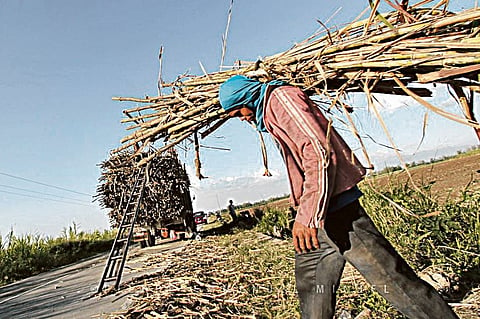

Following the onslaught of the coronavirus disease pandemic in the past two years, one of the sectors adversely affected by the deadly respiratory disease and its subsequent consequences was the sacadas — a term for migrant workers in and from the Philippines, doing manual agricultural labor.
These sacadas, also called seasonal cane cutters, or seasonal daily wage laborers, usually receive a wage during the peak labor season from November to April for being temporary workers usually in sugarcane plantations.
When the pandemic hit, most of the sacadas were out of work and resorted to doing other things while waiting for the national government's subsidy to augment their livelihood and survive for another day.
Most recently, the sacadas of Antique were given a huge lift as at least 4,203 active sugar plantation migrant workers were enrolled in the Social Security System as part of the provincial government's thrust to uplift the lives of these workers.
Randy Ardeño, in charge of the Sacada Desk of the Antique Provincial Planning and Development Office said that upon the direction of Governor Rhodora Cadiao, the long-coveted dream of the "sacadas" to be enrolled in the SSS was made a requirement for the contractors.
"During our collaboration meeting with the DoLE, we discussed the request of the governor for the labor department to make it as a requirement among the contractors that they will have to enroll the 'sacadas' they will be hiring with the SSS," Ardeño said.
"Before the SSS was made as a requirement, the contractors and even the planters were given leeway whether they would only enroll the sacadas with the SSS or not," he added.
Previously, whenever sugar migrant workers suffer an accident in Negros Occidental, they would come home to Antique penniless because they had to pay for their medical bills.
It was also common for the family of the injured sacada to seek help from the Antique provincial government for the Aid to Individuals in Crisis Situation through the Provincial Social Welfare and Development Office for their medication.
"With their SSS enrollment, the 'sacadas' have now the insurance benefit that they could claim, aside from the AICS provided them," Ardeño said.
Previously, SSS-Antique information officer Leory Ninora said the "sacadas" enrolled in the SSS could avail of such claims as disability, sickness, death, and maternity for women.
Likewise, they are now entitled to avail of the retirement benefit after 120 months of paying their premium or get a salary loan by paying the monthly premium of P400 per month.
However, the migratory workers' SSS enrollment is just the first step being taken by the provincial government for their protection.
It is also eyeing to allocate funds for the continued SSS insurance of the sugar migrant workers who will opt to stay for good and work in the province.
"The provincial government then intends to pay for the SSS premium of the 'sacadas' who will no longer be returning to work in Negros Occidental under their contractor," Ardeño said.
'Bisita Sacada'
The provincial government of Antique also launched anew the "Bisita Sacada", or the visit of Cadiao and the provincial board members to check on the situation of the sugar migrant workers in Negros Occidental.
The annual visit was halted in 2020 due to the Covid-19 pandemic.
In 2021, Cadiao — together with members of the Provincial Health Office — went back to Negros Occidental bringing grocery items, medicines, and free medical consultations for sugar migrant workers.
Antique social workers also interviewed the "sacadas" for their requested AICS.
"We also distributed 20 lechon or roasted pig to the contractors on December 20 for the 'sacadas' to share," Ardeño said.
Every year since 2018, when the Sacada Desk was established, they have released 120 livelihood assistance to the workers and their families.
"The 'sacadas' for their livelihood assistance were made to choose whether they would like to put up a grocery store or raise cattle for their farm," he said.
The livelihood assistance amounts to P10,000 for each beneficiary.
The active "sacadas" usually return to Negros Occidental starting September for the milling season, and with the livelihood assistance from the local government, the workers are confident that they have left a source of income for their families to survive the six months that they would be gone.
